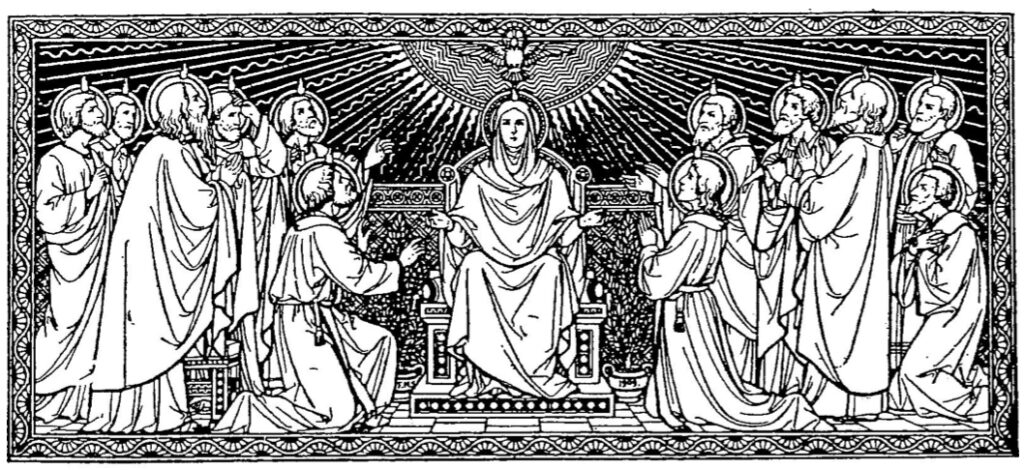Home l Liturgy & Sacraments l Liturgical Calendar
The Third Mystery of Paschaltide: Pentecost

Doctrinal Note for Pentecost
Easter and Pentecost, with the forty-eight days between them, used to be regarded as a single feast of fifty days, on which was kept, first the triumph of Christ, then His entry into His glory, and finally, on the fiftieth day, the anniversary of the Church’s birth.
The Resurrection, the Ascension and Pentecost, are all part of the Paschal mystery. As St. Augustine says, Easter was the beginning of grace, and Pentecost is its crown, since the Holy Ghost then completes the work accomplished by Christ. By His resurrection our Lord has restored to us our rights to the divine life, and at Pentecost He applies them to our souls by communicating to us His Holy Spirit, the “Giver of Life.”
The Ascension forms the boundary line between the two reigns of God in the New Dispensation on earth: the visible reign of the Son of God and the visible reign of the Holy Ghost. The Incarnate Word has finished His external mission among men, and now the Holy Ghost is about to begin His. “The Father” says St. Athanasius, “does everything by the Word, in the Holy Ghost.” Even when the omnipotence of the Father is manifested to us in the creation of the world, we read in Genesis that the Spirit of God moves over the waters to render them fruitful.
Again, when the wisdom of the Word is displayed to us, we are beholden still to the Holy Ghost. It is He “who spake by the prophets”; It was His power that overshadowed the Virgin Mary and made her the Mother of Christ. Finally, it was He, who in the form of a dove descended upon our Lord at His baptism, led Him into the desert, and guided Him through the whole of His public ministry.
But more especially, when He filled the apostles with light and strength on the day of Pentecost, did the Spirit of holiness inaugurate the dominion which he was going to exercise over souls. It was “with the Holy Ghost that the Church was baptized in the Cenacle”, and it was His life-giving breath that came to give life to the mystical Body of Christ, which He had organized after His resurrection. So it was that our Lord breathed on His apostles and said to them: “Receive ye the Holy Ghost . . . Whose sins you shall forgive, they are forgiven them.” And we know that the Holy Ghost is called “the Remission of sins”, and that baptism, whose purpose is to purify our souls from their sins, is given “with water and the Holy Ghost”. “Go out of him, unclean spirit,” says the priest who baptizes, “and give place unto the Holy Ghost the Paraclete”. Thanks to Him, souls are raised to the supernatural state of grace and His supernatural influence can quicken all their thoughts and acts.
Much more than this, where grace is, there is its divine Artificer, which is why the Church calls the Holy Ghost “the sweet Guest of our souls”. He who makes our actions fruitful by “His intimate working”.
It is the purpose of this Holy Spirit to accomplish the work of the formation of the apostles and the Church, in our Lord’s words: “He will teach you all things, and bring all things to your mind, whatsoever I shall have said to you”, and this He does, not only by enlightening the mind, but also by purifying and warming the heart.
The Holy Ghost comes to give testimony to Christ, as the Master Himself foretold, and He gives this testimony not only interiorly by the action of grace in men’s hearts, but exteriorly also, through the medium of the visible hierarchy. The Holy Ghost who once inspired the sacred authors, secures to the Pope and to the bishops grouped around him, that doctrinal infallibility which enables the teaching Church to continue the mission of our Lord. From the Holy Ghost the sacraments instituted by Christ receive their efficacy.
Further, outside the hierarchy, the Holy Ghost raises up faithful souls, who yield themselves with docility to His sanctifying work, this sanctity, which is the triumph of love in the heats of men is justly attributed in the third person of the Holy Trinity, who is the personal love of the Father and the Son. Thus, after the Holy Ghost, the Creed speaks to us of the holy Church, the communion of saints, the resurrection of the body, which is the fruit of holiness and its manifestation in our bodies, and finally of eternal life, which is the plenitude of holiness in our souls.
This supernatural life especially fills our souls at Pentecost, which reminds us of the taking possession of the Church by the Holy Ghost, and which therefore, year by year, strengthens more and more God’s reign within our souls.
Therefore, at Pentecost we celebrate not only the coming of the Holy Ghost, but also the entry of the Church into the heavenly world.
Thus, the anniversary of the Mosaic Law on Sinai becomes, for all Christians, that of the institution of the New Law, by which we receive no more “the spirit of bondage”, but the spirit of adoption of sons, whereby we cry Abba: (Father)”. The Mosaic Law pointed out what had to be done but did not supply help for doing it easily; the Holy Ghost, on the contrary, while making known the Law of the Gospel, gives also abundant graces to practice it, for love is the secret of obedience.
Pentecost is not merely and anniversary, it is also a life, the descent into our hearts of the Holy Ghost. And devotion to the Holy Ghost is the measure of our sanctity.
Historical Note for Pentecost
Before His ascension into heaven, our Lord charges His apostles “that they should not depart from Jerusalem, but should wait for the promise of the Father”, the outpouring of the Holy Ghost. On their return from the Mount of Olives, the disciples, numbering about one hundred twenty, went back to the Cenacle, where they all “were persevering in one mind in prayer with the women, and Mary the Mother of Jesus”.
After this novena, the most solemn ever made, occurred the miraculous descent of the Holy Spirit. which by Divine Providence coincided with the Jewish feast of Pentecost among the Israelites. This “most solemn and most holy day” was the promulgation of the Law on Mount Sinai. Consequently, a considerable number of foreigners who had flocked to Jerusalem from all parts, were witnesses of the coming of the Holy Ghost.
Endued with power from on high, the Church began at Jerusalem, the work of the apostolate entrusted to her by her divine Lord. Peter, the chief of the apostles, first addressed the assembly, and become already a “fisher of men”, brought by the first cast of his net, about three thousand converts into the infant Church. On the following days, the twelve met in the Temple under Solomon’s porch, and like their divine Master, preached the Gospel and healed the sick. Thus, “the multitude of men and women who believed in the Lord, was more increased”.
Subsequently, spreading in all directions outside of Judea, the apostles went forth to proclaim Christ and to give the Holy Ghost to the Samaritans and to the Gentiles everywhere.
Liturgical Note for Pentecost
On the fiftieth day after the passing over of the destroying angel and the crossing of the Red Sea, to the Hebrews encampment at the foot of Sinai, almighty God with great solemnity promulgated His Law. The Jewish feasts of the Passover and Pentecost, which recalled these two events, were the most important in the year.
Sixteen centuries later, the feast of the Passover was marked by the death and resurrection of Christ, and that of Pentecost (fifty days after, as the name implies), by the descent of the Holy Ghost on the apostles. These two feasts, having become Christian in character, are the most ancient of the liturgical cycle, which owes its origin to them. Wherefore, after Easter, Pentecost is the greatest feast of the whole year, having an equally privileged vigil and octave. The book of Acts of the Apostles is read, for this is the season which commemorates the foundation of the Church, of whose beginnings this sacred book gives and account, and this custom is modelled on what takes place in Easter Week. The New Testament puts the Old in its true light by showing that everything that it contained was only the nature of a type. So in the Mass for Pentecost and throughout the octave, the Old and the New Law, Holy Scripture and Tradition, the Prophets of the Church Fathers and the Apostles echo the Master’s words. Like the different pieces of a mosaic, all these parts group themselves in such a way as to bring before the mind a wonderful picture portraying the action of the Holy Ghost down through the centuries of the world’s life.
The priest is clothed in red vestments which recall the tongues of fire. Formerly, in certain churches, while the Veni Sancte Spiritus was being sung, a shower of red roses was let fall from the roof, while a dove flew about over the heads of the faithful. Sometimes a trumpet was sounded during the Sequence as a reminder of the trumpet of Sinai or the mighty sound in the midst of which the Holy Spirit descended upon the apostles.
The octave of Pentecost is privileged of the first order. Thus, is clearly expressed the Church’s intention that during these eight days we should choose for our spiritual reading and meditation subjects connected with Pentecost.
-St. Andrew’s Daily Missal
Copyright © 2015-2025 Saint Joseph Catholic Church, Latin Mass Parish, 602 S 34th St., Tacoma, WA 98418. All Rights Reserved.
Website comments or questions: info@saintjosephtacoma.org


